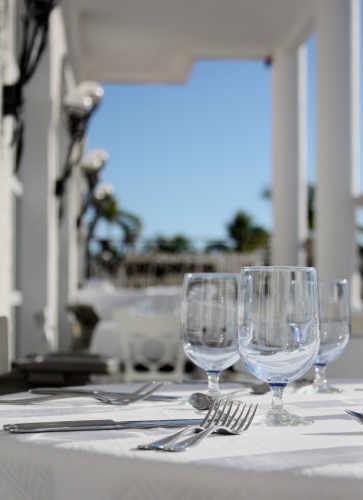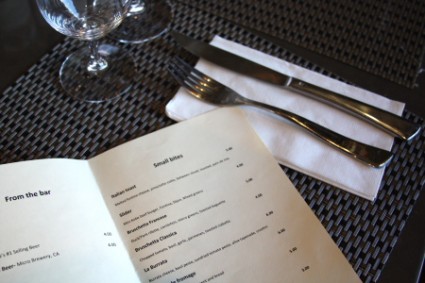Welcome to Service 101: a behind the scenes look at the food service industry. Today’s topic: restaurants as a business.

Lots of people pay for the luxury of eating out. But how is it those very same diners don’t think of restaurants as a business? Though the average diner understands the concept of paying the bill at the end of the meal, many see restaurants as a kind of public service for their neighborhood or city. For them, the restaurant is a public space put there to serve their culinary and social needs—rather than a place of business that is designed to assist them in getting sustenance in a pleasant atmosphere.
Take for example The Angry Late Guy. He books a table for four on a busy Friday night at 8 pm, but doesn’t show until thirty minutes after his reservation time. The restaurant holds the table for the gentleman and his guests for 15 minutes, but when he never arrives, the restaurant does what it must do: they give the table to someone else. Why? Not because the restaurant is spiteful, disorganized, or uncommitted to serve their guests. It is because they are a business, and empty tables cost restaurants money.
Airplanes leave gates and trains leave their station without tardy passengers every day, and yet, when Angry Late Guy saunters in well past his reservation time, he becomes indignant. How is it his table still isn’t available? Angry words ensue.
Looking to appease the unhappy guest, the manager extends an olive branch with this offer: We can give you a table but we must ask that you give the table back to us in an hour. The Angry Late Guy accepts.
One hour and twenty minutes later, the waiter drops the check. The Angry Late Guy insists that he isn’t done with his meal. He’d like to see a dessert menu. The manager approaches the table, apologetic. He offers to have desserts wrapped up to go for the guest and reminds the gentleman of his agreement. “How dare you,” yelled the guest. “I am a paying customer!”
The Angry Late Guy storms out of the restaurant, promising never to return again. Later, while the man fumes at home, he vows to make the restaurant pay in some way for his mistreatment.
Moments like this happen every night at restaurants all across the country. But they don’t have to.

The fact that customers can not believe that restaurants are a business, is the very thing that keeps many diners unhappy every time they go out to eat. The customer that continues to believe restaurants are a public service will forever be destined for disappointment. These are the very same people that rant online about arrogant restaurateurs that sat them late (due to people like Angry Late Guy), gave their table away, had the gall to charge corkage, or presented a check with gratuity added to a large party.
Perhaps it is the comforting atmosphere of a restaurant, mixed with the primal act of consuming food and beverage, that blurs customers’ understanding of reality. But the cold hard fact is that restaurants, on the whole*, are a low-profit business that requires customers to follow a certain business model: they should order food that appeals to them and should consume it within a reasonable amount of time (approximately one and a half hours to two and a half hours, depending on the restaurant) so that the next guest can be served. In order for diners to enjoy themselves they need to wake up to the cold hard fact: restaurants are businesses.
If a leisurely dining experience in a beautiful atmosphere without any fear of losing your reservation because you’re more than a few minutes late is what you truly want, I suggest you make a reservation for a picnic table at your nearest community park. Because guess what folks, restaurants are not pretty rooms filled with picnic tables: they’re a business.


Nice post with a lot of great points!
No question that restaurants are businesses…but aren’t they in the business of serving diners? A customer focus is vital in service-oriented businesses, some companies forget that when designing their policies. I wholeheartedly agree that we as diners could stand to be more reasonable with our requests but I also wouldn’t expect to be run out of my table if I happened to arrive late. I might expect to have to wait a little longer to be seated. Reputation matters – I’d hope that a good business-minded restaurant would seek ways to accommodate its customers (even the demanding ones) so that they in turn will recommend the place to others.
Kathy, It’s true that restaurants are in the business of serving diners and customer focus is vital. And like you said, customers need to realize that restaurants are businesses and should treat them as such. As Rico points out, when you’re running late, a phone call goes a long way for restaurants. When a customer arrives late for the reservation, is sat right away (as opposed to being put on the wait list–which sometimes can take an hour or more), and agrees to an out time, the customer should uphold their side of the agreement.
Bravo, well said. What a fantastic article. It is true that when some people come into restaurants they feel as if the restaurant is doing them a favor by being there and should cater to their every whim since the customer is always right. I have been late for a reservation and have found that a simple call ahead to the restaurant alerting them of your situation works wonders & allows them to make arrangements on their end. Restaurants already bend over backwards to accommodate both the ridiculous and serious culinary needs of customers without the additional hassle of the lifetime reservation issue. Look forward to the next chapter.
“Because guess what folks, restaurants are not pretty rooms filled with picnic tables: they’re a business.”
So true!
And clearly I’m slacking instead of working on my article. Ruhlman would be disappointed. 😉
You’re right, but I’m glad you took the time to come by, though! Get writing, sister! I want to hang out with you sooner than later!
excellent article. i worked my way through college working in restaurants and bars, and then continued to work in restaurants post college to supplement my meager post college salary. i worked every service job possible, including bus boy, hostess, server, bartender and cocktail waitress. as an adult, i make it a rule to call ahead if running even 5 minutes late (don’t we all have cel phones?). if i need to cancel my reservation, i call with as much notice as possible. when when i worked as a hostess, there was nothing more stressful than looking at a book full of reservations, the clock ticking past the reservation time and a line of people waiting for the visibly empty tables in the dining room. the restaurant has every right to give away a reserved table to a waiting guest if there is no sign the reservation is going to be kept. the hosts aren’t mind readers, and they don’t know if you’ve changed your mind or quadruple booked tables all over town in order to decide where to eat at the last minute. be on time for your reservation or call. or eat at home.
Thoughtful post, and definitely something patrons need to keep in mind if they find themselves disappointed with a restaurant’s service.
One thing I don’t agree with (in general – not your post) is added gratuity. I know this topic has already been debated to death, but what point does it serve? If I’m pleased with my dining experience, I’m more likely to tip 20+ish %, but if the waiter has already added 16-18%, I usually find myself annoyed and/or offended, and I definitely won’t be adding any “additional gratuity.” Plus, in large groups (where this seems to be acceptable), it seems that everyone in our party will “warn” the other guests “Watch out, they already included tip” . . . Isn’t Added or Automatic Gratuity one step away from Socialism??
PS – I have waited tables before and think everyone else should, too, at some point in their life. It will/can make you appreciate all that goes on in the restaurant/food-service industry
PPS – Sorry for the novel.
I totally see the point of an automatic gratuity for large parties, and when I’m in a large party I appreciate not having to calculate the tip (because invariably someone pays too little, and the server gets screwed). That being said, I think that guests should be reasonable but restaurants should also realize they’re in the service industry. (The airplane analogy doesn’t really work because airline flight can be seen as a “necessity” while restaurants nearly never are. Therefore restaurants should (and most do) make greater strides towards accommodating their customers, though there is, of course, a limit. Graciousness goes a long way on both sides, however.
Well put! As you know I work at as restaurant as well and I experience the same thing if not worse daily! I’m glad you are here to put it in perspective for people… now how can we get this simple and clear message across to customers?
Amen. I mean AMEN!!!!!!
I think it all boils down to respect. It’s not enough to understand that a restaurant is a business, but patrons should respect the people who are behind making their eating experience even possible. Being late for any sort of appointments is a huge pet peeve of mine, since it demonstrates a total disregard for the other party’s time. And time means money in this case and many others. But the situation won’t change until those who lack respect (such as Angry Late Guy) changes their own attitude.
Without denying anything that’s been written, this seems like a very American viewpoint.
In many latin countries (Spain, France, Mexico, etc.), an implied time limit doesn’t seem to apply. Sometimes one has to chase down the server to pay and leave!
What I’ve seen with reservations, too, is that if you call with an ETA when late, that they can shuffle tables around so that there are no tables left empty. Most hosts are only too happy to receive a call with an updated ETA except in the kind of restaurant where it’s impossible to get a table without weeks notice in the first place.
Gib,
The thing I recently learned about European restaurants is that part of the service protocol is to never drop a check unless asked. In Europe, it’s considered rude to drop a check at the end of the meal. Since I work at an Italian restaurant, we hold the same policy–which often leads to a lot of misunderstandings. For this reason, I tend to carry a diner’s check with me near the end of their meal so that I can read the guest for the International Sign of “I’m ready for the check.”
Thank you for your comment. You’re absolutely right about how important it is to place a phone call to a restaurant to let them know about being late for your reservation. That way, you put the power back into the hands of the restaurant to move things around.
As usual you write so well about a subject that often gets over looked – especially in an age when the Angry Late Guy gets his revenge via Yahoo/Chowhound. I really hate getting to a restaurant on time and then having to wait a long time for the table – usually because Angry Late Guy is taking his time ‘paying his bill’. As is often the case it’s the way these situations are dealt with that makes the difference between a returning customer and an unhappy internet slanderous one.
I agree with you, and it works in reverse also. We went to a restaurant at 5:30 on a Saturday night. All empty tables. They would not seat us as we didn’t have a reservation. We ate at the bar. An hour later, most of the tables were still empty.
During the entire dinner, we were watching and waiting for tables to fill, feeling increasingly resentful. They treated us like “less thans” because of no reservation. This is a locally owned restaurant five miles from my home. Ask me if I’ve ever returned.
@Angela:
A couple of things:
As heartless and “uncustomer service like” as it sounds, you WERE “less than”. “Less than” than those who had the foresight to make a reservation in a popular restaurant on a Saturday night (even if you came in at 5:30). How do I know that it’s popular? Because the restaurant was likely full by 7 – 7:30 with every table already reserved. Because they were loath to seat you in the dining room. Because they were overcautious in giving away a table that had been promised to another. The thing is, the restaurant had probably been burned in the past by the very thing outlined in the article, i.e. “We’ll eat in an hour and you can have your table back” only to have people overstay their welcome because, “What are they going to do, kick us out”? People get very possessive of their table once they’ve been sat, especially in a popular restaurant. How do you think you’d feel if you had made a 6:30 reservation and your table wasn’t available because someone who hadn’t bothered to make a reservation had decided that their coffee and “catching up” was more important?
Also, if you like the restaurant and it’s a quality place, who are you really hurting by withholding your patronage? Sure, restaurants need every patron that they can get their hands on these days. But diners need every quality restaurant as well.. And a restaurant loses you, one out of thousands of guests, but you’ve “lost” one of a few quality restaurants that you might actually like. It seems like you’re cutting off your nose to spite your face (as my mom used to say).
Having said all of that, surely the restaurant could have found a better solution. Perhaps your quiet acquiensence made them think that they had INDEED found an equitable solution. But they’ll never know, will they? They’ll never know the pleasure of serving you, but you’ll never again know the pleasure of their food, now will you? So who loses the most?
There are certain restaurants that really require reservations, espeically non-chains. Sometimes they can accomodate walk-ins, but Saturday night is problematic for many. That’s prime time (even at 5:30 with the first reservations at 6:00 – 7:00 pm) and it’s risky to alienate their reserved guests. After all, we’re not talking about Chili’s, are we?
You should really give them a second chance and when you do, simply make a reservation, that is, if you liked the food. Don’t let YOUR failure to take care of business blind you to the possibility of a great meal. If you think you’re hurting them greatly by your non-presence, think again. There’s a reason why they were booked up. You’re hurting yourself far more by depriving yourself of their cuisine than they are suffering from your non-attendance. Why not have the last laugh and make them serve you? Just do it the right way so that it’s a win-win. Don’t go in with a chip on your shoulder.
“So You Want To Be A Waiter” blog
Brooke, great piece. I think diners in this city just don’t understand the ethics of making reservations and enjoying dinner at a place. There has to be a mutual appreciation by the FOH staff and diners, both need each other. I think as the restaurant-going culture in LA develops, people will see that dynamic, but since we’re still a relatively “young” city in that sense (unlike perhaps SF or NY), then we end up with idiots like the one you mentioned in your post. Personally though, I would’ve tried to call him ahead of time to confirm the reservation (you might’ve already done this), and let him know that the table will be held for 15 minutes and to call if they are running late. If I’m even one minute late, I will call a restaurant to let them know, and if I know I’ll be more than 15-20 minutes late, I will call the restaurant with the understanding that my table may not be available, and settle for the bar or perhaps another restaurant for that evening.
There’s a joke that we restaurant people like to tell each other that goes something like this: tell the guest about time constraints and arrival times all you want. The minute the conversation is over, however, all that you have said will be forgotten. The (not so) funny thing is, that this joke always seems to come true. Many diners refuse to believe that restaurants are a business and treat them as a public service.
Hi Brooke,
How about requiring patrons to sign an “informed consent” agreement upon entering the restaurant door, including blank spaces for staff to write in details of the customer’s treatment plan. ;0)